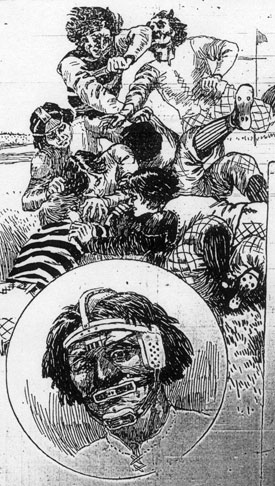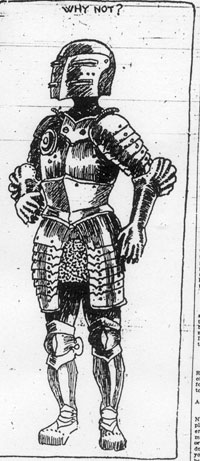Dec. 20, 2011
Nashville sports historian Bill Traughber has recently written another book, Vanderbilt Football: Tales of Commodore Gridiron History. The 160-page paperback book can be ordered on historypress.net for $19.99.
Commodore History Corner Archive
 The Vanderbilt Commodores are about to complete their 121st year of football. The 2011 edition is preparing for only the fifth bowl game in the university’s history with a New Year’s Eve game in Memphis against Cincinnati. There have been times in the early years of college football history that the game was under consideration for abolishment. The game was thought to be too rough with serious injuries and even deaths being recorded from games and practices.
The Vanderbilt Commodores are about to complete their 121st year of football. The 2011 edition is preparing for only the fifth bowl game in the university’s history with a New Year’s Eve game in Memphis against Cincinnati. There have been times in the early years of college football history that the game was under consideration for abolishment. The game was thought to be too rough with serious injuries and even deaths being recorded from games and practices.
The October 30, 1898 edition of the Nashville American gave a report on the debate to abolish the game. The headline for the story stated, “How Many Lives Are To Be Sacrificed During This Season?” More notices to the story read, “HUMAN BLOOD STAINS GRIDIRON” and “Horrors of the Foot Ball Field Have Given Rise to an Agitation in Favor of Abolishing the Game” and “BEEN FORBIDDON IN SOME COLLEGES.” This is a portion of the story:
“Is foot ball becoming so brutally dangerous as to call for legislate restriction or abolishment? Just as the desire for the superseding, of war by arbitration to straightening out international complications had its birth in the grief and tears of the widow and the fatherless, so does the above question owe its origin to those who have been seen promising young men cut off in the prime or their youth, or maimed for life by the disparate struggle for foot ball honors. Year after year the list of victims grow, until the matter has at last attracted national attention and in the absence of laws, declaring that young men may not risk life and limb in the gridiron contests some college authorities are forbidding the students to play foot ball, and thus it comes about that institutions that have been prominent in this branch of sport will not be heard of during the present season.
“A study of the casualties of the foot ball fields proves that those who oppose the game on account of its brutality and danger are justified in their views. Here are a few of the causes of death on the foot ball field or injuries received that resulted in death later:
“Two opposing players running. A careless tackle by one caused the heads of the two to come violently together. Result, one man serious hurt that concussion of the brain, ensued ending in death.
“A scrimmage. Man holding ball went down with as many men atop of him as could get near enough to add their weight to the heap. Lower man did not rise when the mass disentangled itself. Examination showed that his neck had been broken, killing him instantly.
“Four players fell in a heap. In the struggle one lashed out with his foot, catching another on the head with the heel of his heavy shoe. Kicked man died three days later.
“The list could have been extended half way down the column, and a perusal of the news pages of the daily journals will show that deaths or injuries, broken bones, dislocated shoulders, smashed noses and sprained ankles are of daily occurrence among foot ball players.
“Were it not for the fact that foot ball men of the colleges are young giants who have hardened their muscles and rendered themselves proof against lighter injuries by reason of the fact that they are trained athletes, and have practiced falling and tackling so as to reduce the possibility of accident to a minimum, the list would be much larger. Nevertheless, pertinently query the opponents of foot ball, what youth, however well trained, can be a foot ball-accident immune, which at stages of the game he is pretty sure to be the pivotal point of a squirming human pyramid weighing 2,000 pounds? If the game cannot be played without such dangerous features as this, they say, then better strike it from the list of sports.
“If the hardened college athlete is not able to play the game without risk of injury, or death what hope is there for the young bank clerk or schoolboy who pits his small muscles against these of others of his class and is thumped and pounded in the line or banged to earth in the tackling?”
The story also reported on the concerns at West Point on the injuries by its cadets occurring on the football field. It was pointed out “the lives of the West Point students were too much importance to the country with them in rough-and tumble rushes on the foot ball field.”
The story also printed comments from various college administrators in the eastern part of the country where football began.
President Hall of Clark Universityâ€â€ÂI consider foot ball a splendid game, and think its merits far outweigh the brutality, which I think is very rare, indeed. I think there is not enough in modern life to develop the natural instinct of pugnasticity and the nation suffers for lack of individual independence and moral bard hood in consequence. I prize very highly the effect of personal encounter and would like to see boxing taught to every healthily young man.
 President Alderman, of the University of North Carolinaâ€â€ÂThe foot ball team of this University will not be withdrawn because of the agitation against the game. Properly managed and safeguarded from the influences that surround all sports, I believe that foot ball makes aggressive manliness and strength for those who play it. It suits the stuff in our Anglo-Saxon American blood, demanding a ready brain, the quick eye, the stout heart, power of restraint and readiness for emergencies.
President Alderman, of the University of North Carolinaâ€â€ÂThe foot ball team of this University will not be withdrawn because of the agitation against the game. Properly managed and safeguarded from the influences that surround all sports, I believe that foot ball makes aggressive manliness and strength for those who play it. It suits the stuff in our Anglo-Saxon American blood, demanding a ready brain, the quick eye, the stout heart, power of restraint and readiness for emergencies.
President Johnson of Genevaâ€â€ÂI am decidedly of the opinion that we will cease to play foot ball, unless the colleges cease to hire professionals. I am greatly in favor of the game if genuine students meet genuine students.
President Beckham of the University of Vermontâ€â€ÂFoot ball, as now played, is a game more fit for savagesâ€â€Âwith whom I supposed it originatedâ€â€Âthat for college students. But until some game is invented which taxes and rewards pure physical energy without calling out the brute in a man, I suppose football will have to be tolerated among young’ men’s sports. But purely the brutal instincts, which it calls out, should be put under severer restraint than they are now.
E. M. Cavarth, the president of Nashville’s historically black Fisk University weighed inâ€â€ÂWe are contemplating no change in regard to foot ball in Fisk University the coming year. We have found the same healthful and proper when played under proper restrictions.
During the Theodore Roosevelt administration a meeting was held at the White House with various college athletic officials in attendance to discuss the violence in football. President Roosevelt was also concerned about the deaths and serious injuries football was recording. Over the decades injuries have been reduced with rule changes, better equipment and advancement in training habits. But it is a contact sport with serious injuries and occasional deaths still occurring.
The drawings accompanying this story are from the 1898 Nashville American story.
Traughber’s Tidbit: Vanderbilt’s 1898 record was 1-5. Its lone win came over the University of Nashville (Peabody), 5-0. Losses were to Cincinnati (10-0), Georgia (4-0), Virginia (15-0), Central University of Kentucky (10-0) and Sewanee (19-0).
Tidbit Two: Vanderbilt has played the University of Cincinnati seven times and has a record of 4-3. The victories came in 1934 (32-0), 1977 (13- 9), 1993 (17-7) and 1994 (34-24). Losses came in 1898 (10-0), 1899 (6-0) and 1976 (33-7).
Tidbit Three: Good Luck to the Commodores in the Liberty Bowl! Go ‘Dores!
If you have any comments or suggestions you can contact Bill Traughber via email WLTraughber@aol.com. In the next three months look for interviews with several former Vanderbilt basketball greats.


